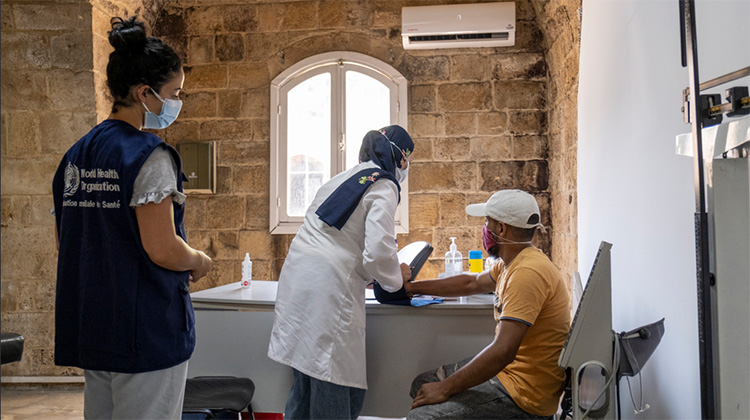 Nurse Lotfiye Samra checks a patient’s temperature at the Rjail Arbaeen Primary Health Centre in Saida, Lebanon, which functions as a site for influenza-like illness surveillance. Respiratory samples are collected from symptomatic patients and tested for influenza, SARS-CoV-2 and other respiratory viruses. Information from this routine surveillance is important to inform national, regional and global actions on preparing and responding to respiratory viral diseases. © WHO/Natalie Naccache.
Nurse Lotfiye Samra checks a patient’s temperature at the Rjail Arbaeen Primary Health Centre in Saida, Lebanon, which functions as a site for influenza-like illness surveillance. Respiratory samples are collected from symptomatic patients and tested for influenza, SARS-CoV-2 and other respiratory viruses. Information from this routine surveillance is important to inform national, regional and global actions on preparing and responding to respiratory viral diseases. © WHO/Natalie Naccache.
9 November 2022 – Although the COVID-19 pandemic is not yet over, WHO is also now focusing on preparedness for the 2022–2023 influenza season, which is likely to be more severe this year, following a record low in cases over the past 2 winters. The impact of influenza and COVID-19 circulating at the same time is likely to be of concern for national health systems, particularly in protecting vulnerable groups such as children, pregnant women, older people and health care workers.
The experience of the Southern Hemisphere in 2022 – where the flu season from March to September is now over – demonstrated a rise in influenza cases. Based on this observation, the Eastern Mediterranean Region is also expecting influenza to return to the same levels as before the COVID-19 pandemic, after they had decreased in 2020 and 2021.
Public health and social measures, such as mask wearing, hand sanitization and social distancing, not only hindered the wider spread of COVID-19, but also greatly curbed the transmission of influenza. With the gradual lifting of COVID-19 preventative measures by governments in many countries, and the waning population immunity over the past 2 years due to the substantially lower spread of influenza, the 2022–2023 influenza season is likely to be more challenging than previous years.
One of the strategies of the WHO Regional Office to help countries prepare for the next influenza season is accelerating influenza vaccination, especially for high-risk groups – such as pregnant women, children aged 6 months to 5 years, people aged over 65 years, people with chronic medical conditions and health care workers – with WHO country offices assisting vaccination programmes on the ground.
It is important that countries continue to monitor the seasonal influenza activity closely, both in primary care settings and in hospitals (for severe and complicated cases), and to ensure that representative samples are tested and sent for genomic sequencing wherever possible. WHO is supporting countries to procure laboratory equipment, as well as offering technical support to enhance surveillance and reporting for improved understanding and tracking of the virus, and developing and disseminating education and advocacy materials.
Of the 22 countries and territories in the Region, 21 have a functional influenza surveillance system, national influenza centre and laboratories, and several countries have the capacity to conduct genomic surveillance – which allows the detailed study of the virus and its mutations – since influenza viruses change not only from season to season but sometimes during the same season. As for vaccination, 13 of the Region’s countries/territories have a national seasonal influenza vaccination policy in place, and WHO is working with countries so that all may soon have one.
The available evidence does not show increased adverse effects due to receiving the influenza vaccine at the same time as the COVID-19 vaccine, nor does co-administration result in any change to the body’s immunity response. What every individual can do for protection against severe disease resulting from influenza – and from COVID-19 – is to get vaccinated.








